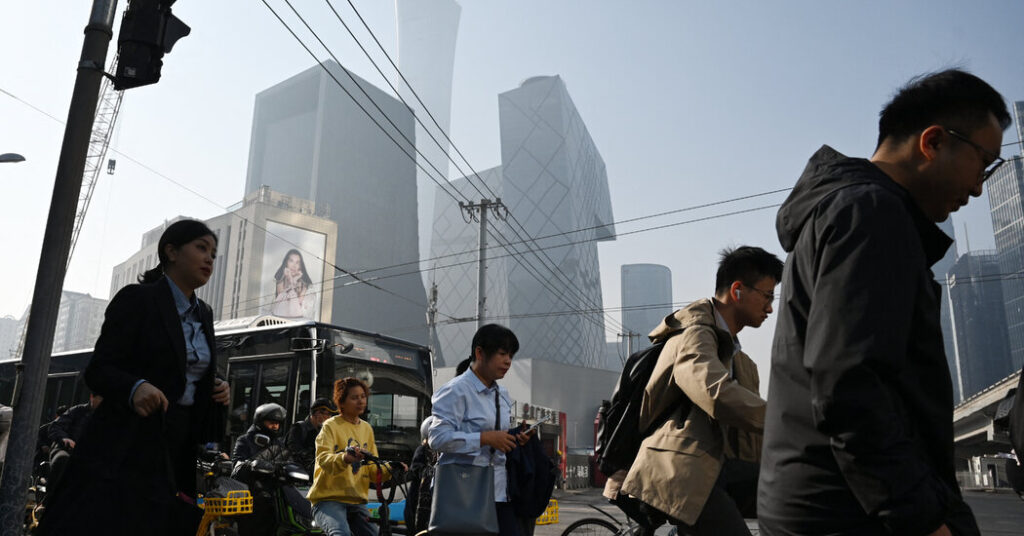If the trade war between China and the United States is a game of high-stakes brinkmanship, it is currently a game that Beijing is not willing to play.
Faced with growing claims by President Trump and administration officials that the two countries are engaged in talks and that a deal could be reached in a matter of weeks, China’s Foreign Ministry pushed back forcefully on Friday by posting on X: “China and the U.S. are NOT having any consultation or negotiation. The U.S. should stop creating confusion.”
The post came hours after a foreign ministry spokesman, Guo Jiakun, said the United States was “misleading the public.” A day earlier, Mr. Guo called the rumors of talks “fake news.”
The response was the latest sign that China’s top leader, Xi Jinping, intends to hold firm in his standoff with Mr. Trump, sensing that his position is strengthening. Beijing is betting that it can stomach the pain of a trade war better than the Trump administration can because of U.S. political pressure and volatility on Wall Street, analysts say.
“The Chinese are not eager to climb down the ladder,” said Yun Sun, the director of the China program at the Stimson Center in Washington. “They see Trump as wanting to climb down and are happy to let him stew in his own juice.”
Ms. Sun said Beijing will not come to the negotiation table without any U.S. concessions or a good-will gesture. That could include scaling back tariffs, or making clear that Mr. Trump is reaching out to Mr. Xi first.
“Beijing has the upper hand, why bother to reach out?” Ms. Sun said. “If the U.S. wants to talk, it will have to pay a price.”
In an interview with Time magazine published on Friday, Mr. Trump said that Mr. Xi had called him and that the two were trying to strike a tariff deal.
“I don’t think that’s a sign of weakness on his behalf,” Mr. Trump said of Mr. Xi’s call, according to the article.
China has not said that Mr. Xi has spoken to Mr. Trump since a call they held on Jan. 17, three days before Mr. Trump’s inauguration.
It is not the first time Mr. Trump has claimed to have spoken to the Chinese leader since returning to the White House. In February, he told the Fox News host Bret Baier in an interview that he and Mr. Xi had spoken sometime after the Jan. 17 call.
China, which has imposed its own jaw-dropping tariffs on U.S. goods in retaliation, has repeatedly said that it is open to trade negotiations, but that it would not do so under duress. The United States needs to treat China with respect, officials have said, adding that Beijing is willing to “fight to the end” if necessary.
China’s tough posture reflects Mr. Xi’s need to project a strongman image against the Trump administration. The Chinese leader sees himself as a transformational figure restoring glory to his country in the face of Western bullying, namely by the United States.
Unlike during the first Trump administration, China believes it is better prepared to fight back in a trade war because of an array of new economic tools like export controls. Earlier this month, in response to a new round of U.S. tariffs, China restricted American access to critical rare earth materials needed to produce missiles, batteries and semiconductors. China dominates the market for rare earth elements, while attempts by the United States to find alternative sources are still years from bearing fruit.
“Beijing considers its control over rare earth minerals to be a crucial component of its arsenal in the trade war with the U.S.,” said Eswar Prasad, an economist focused on international trade at Cornell University. “Beijing knows well that restricting access to these minerals would severely disrupt U.S. high-tech manufacturing, causing significant pain to the more dynamic parts of the U.S. manufacturing sector.”
A prolonged trade war would test Mr. Xi’s leadership by inflicting serious pain on the Chinese economy, which has already been hobbled by a property crisis and weak consumer confidence. Exports remain one of the only engines of growth for China, and the United States is the country’s largest single export market.
In a sign that China may already be feeling the sting of the trade war, the Chinese government is apparently considering whether to exclude some essential products from its retaliatory 125 percent tariffs on American goods, including lifesaving drugs and other health-care products, according to the American Chamber of Commerce in China.


